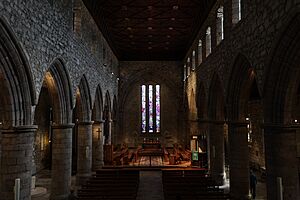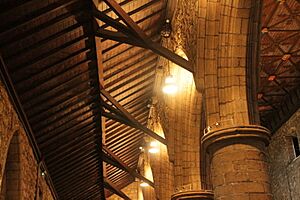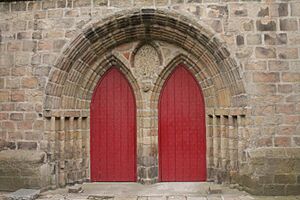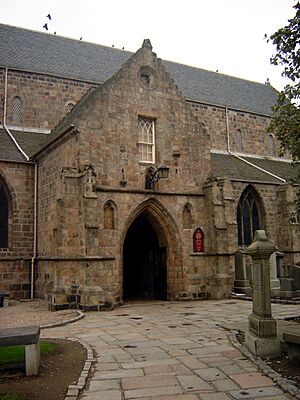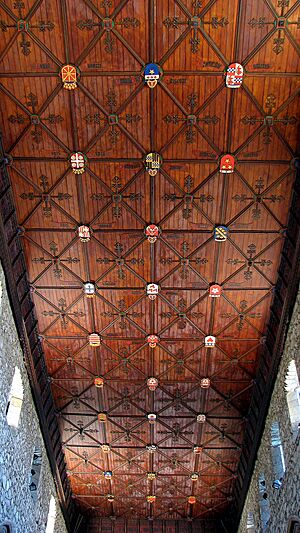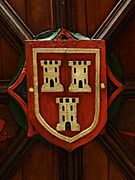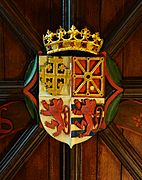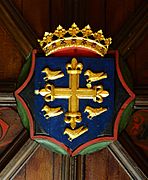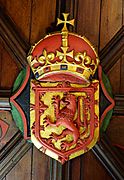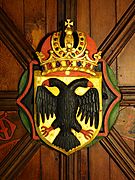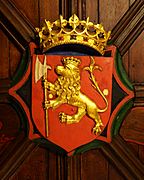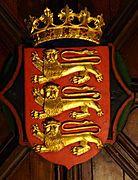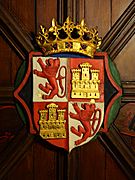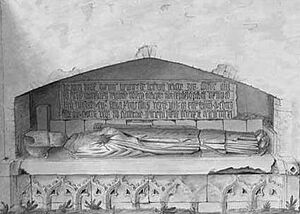St Machar's Cathedral facts for kids
Quick facts for kids St Machar's Cathedral |
|
|---|---|
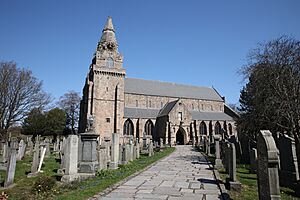
St Machar's main entrance (south)
|
|
| Location | The Chanonry, Old Aberdeen, Aberdeen AB24 1RQ |
| Country | Scotland |
| Denomination | Church of Scotland |
| Previous denomination | Roman Catholic |
| Churchmanship | Presbyterian |
| Website | [1] |
| History | |
| Dedication | St Machar |
| Administration | |
| Presbytery | Aberdeen |
St Machar's Cathedral is a historic church in Aberdeen, Scotland. It is located north of the city centre in an area called Old Aberdeen. Even though it's called a "cathedral," it hasn't been the main church for a bishop since 1690. Today, it's a very important Church of Scotland building, sometimes called a "high kirk."
Contents
Discovering St Machar's Cathedral's Past
How St Machar's Cathedral Began
The story of St Machar's Cathedral starts with St Machar. He was a friend of St Columba, a famous saint who traveled to Iona. A legend from the 1300s says that God told Machar to build a church where a river bent like a bishop's staff before flowing into the sea. The River Don does this near where the cathedral stands today.
According to this legend, St Machar started a place of worship in Old Aberdeen around the year 580. Later, in 1131, a new Norman-style cathedral was built. This happened after King David I moved the church's main office from Mortlach to Aberdeen. Not much of that first cathedral remains today.
Building the Cathedral: A Long Journey
In the late 1200s, Bishop Henry Cheyne wanted to make the church bigger. However, his work was stopped by the Scottish Wars of Independence. Even so, some of his work, like the pillars for an extended choir, can still be seen today. These pillars have decorated tops made of red sandstone. They are some of the best stone carvings from that time in Scotland.
Later, Bishop Alexander Kininmund II took down the Norman cathedral in the late 1300s. He began building the nave, which is the main part of the church where people sit. He also started the granite columns and the towers at the western end. Bishop Henry Lichtoun finished the nave, the front of the church, and the northern side section. He also started the central tower.
Bishop Ingram Lindsay completed the roof and the floor in the late 1400s. More work was done over the next 50 years by Thomas Spens, William Elphinstone, and Gavin Dunbar. Bishop Dunbar is famous for the special ceiling with coats of arms and the two western spires.
Changes Over Time: Reformation and Storms
In 1560, during the Scottish Reformation, the chancel (the area around the altar) was taken down. The church bells and lead from the roof were sent to be sold, but the ship carrying them sank.
A big storm in 1688 caused the central tower and spire to collapse. This destroyed the choir and other parts of the church. After this, the church was rebuilt, but only the nave and its side sections were used for worship. The parts that were ruined are now looked after by Historic Environment Scotland. They contain old tombs of bishops, protected by modern covers.
The cathedral is mostly built from strong granite. It has a unique flat ceiling in the nave, made in the early 1500s. This ceiling shows the coats of arms of kings from Europe and important Scottish leaders of that time.
St Machar's: A Strong Church Building
St Machar's Cathedral is an example of a "fortified kirk," meaning it was built to be strong like a castle. It has two towers, which might have been inspired by St John's Kirk in Perth. The thick walls of these towers contain spiral staircases and battlements (parts of a wall with gaps for defense). The pointed tops, called spires, were added in the 1400s. Bishops Gavin Dunbar and Alexander Galloway built these western towers and added the famous ceiling.
People Who Served at St Machar's
Ministers of the Cathedral
The minister of St Machar's Cathedral since 2021 has been Sarah Brown. Before her, Reverend Jane Barron became the first female minister of the cathedral in 2011. She had previously served in Jerusalem and Dundee.
Many important people have served as ministers at St Machar's over the centuries. For example, James Lawson was the first Presbyterian minister from 1569 to 1572. He later moved to St Giles Cathedral in Edinburgh to take over from John Knox.
Keeping the Cathedral Beautiful
Restoration and Improvements
In recent years, a lot of effort has gone into restoring St Machar's Cathedral. The battlements on the western towers, which were unfinished for centuries, have been rebuilt to their original design. This has made the outside of the cathedral look much better.
Inside, several important stone monuments have been carefully displayed. These include:
- A cross-slab from the 600s or 700s, which is the only proof of early Christianity in Aberdeen.
- A rare cross-head from the 1100s.
- Well-preserved statues of old church leaders, which show what clothes were like back then.
A newer addition is a carved wooden artwork that remembers John Barbour. He was a church official in Aberdeen who wrote a famous poem called The Brus in the 1300s.
In 1987, bells from another church were restored and installed at St Machar's. This makes it one of the few churches in Scotland with bells designed for "change ringing," a special way of ringing bells in patterns.
In 2020, the cathedral completed a big project. They replaced the roof, cleaned the special ceiling with the coats of arms, and fixed some of the beautiful stained glass windows.
The Art of Stained Glass Windows
For a long time, stained glass windows were not allowed in Scottish churches. They only started to be reintroduced in 1866. Because there were no local artists or skills, the first windows came from England.
The cathedral has many stunning stained glass windows:
- The main west window was made by Clayton and Bell in 1870.
- The main east window was created by William Wilson in 1953.
- Windows in the north aisle include works by Marjorie Kemp (showing the Parable of the Talents and the Nativity) and Margaret Chilton (including the Dorcas window).
- Windows in the south aisle feature works by Daniel Cottier and Clayton and Bell.
- Two very special windows in the south aisle were made by Douglas Strachan. One from 1913 is called the "Bishops Window." Another from 1924 is a war memorial, showing St Michael and a dragon over Aberdeen Bay.
The Famous Heraldic Ceiling
The ceiling in the nave is very special. It has 48 coats of arms arranged in three rows. These shields represent important figures and places from the 1500s when the ceiling was made.
Some of the coats of arms you can see include:
- The shield of Pope Leo X in the centre.
- Shields of Scottish archbishops and bishops.
- The shield of King's College.
- The arms of kings like Henry VIII of England, James V of Scotland, and Holy Roman Emperor Charles V.
- The arms of St Margaret of Scotland.
- The coats of arms for the city of Aberdeen and important Scottish families like Gordon, Lindsay, Hay, and Keith.
Around the edge of the ceiling, there's a border that lists the bishops of Aberdeen from 1131 to 1560. It also lists the Scottish kings and queens from Máel Coluim II to Mary, Queen of Scots.
Burials at St Machar's
Inside the Cathedral
Several important church leaders are buried inside St Machar's Cathedral. These include various Bishops of Aberdeen from the 1300s to the 1600s. For example, Henry de Lichton, who was bishop from 1422 to 1440, is buried here.
In the Cathedral Graveyard
The graveyard around St Machar's Cathedral is also the resting place for many notable people. These include authors, artists, professors, and missionaries. For instance, the author J.J. Bell and the artist Robert Brough are buried here. Also, Robert Laws, a missionary who worked in Malawi, is buried in the cemetery.
Images for kids
 | Delilah Pierce |
 | Gordon Parks |
 | Augusta Savage |
 | Charles Ethan Porter |


